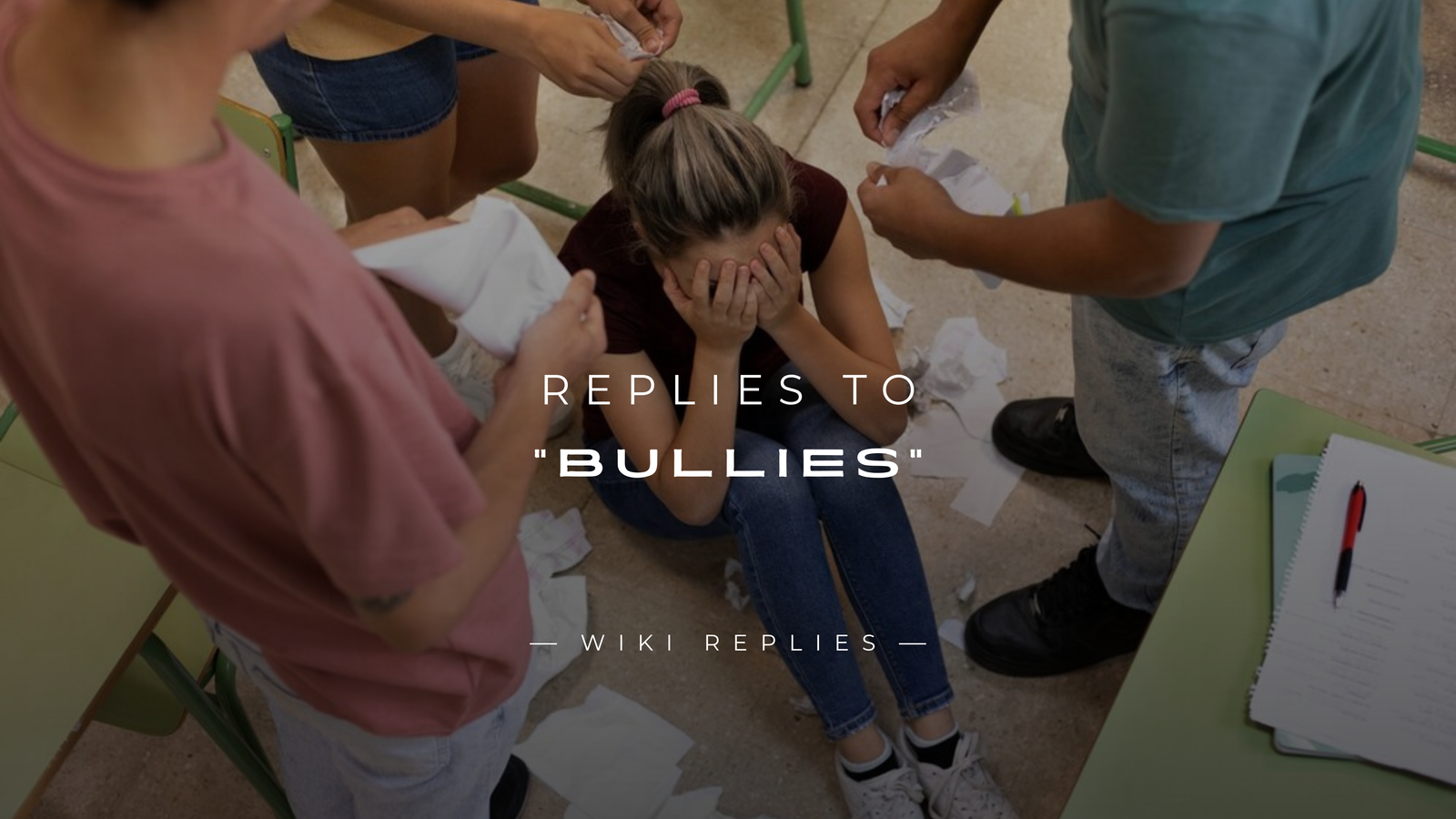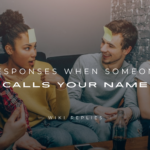Let’s face it—bullies are everywhere. They’re not just lurking in school hallways anymore. You might find them at work, online, or even within your own circle of acquaintances. It’s an unfortunate reality that many of us have faced or continue to face at some point in life. But here’s the good news: you’re not powerless.
Responding to bullies effectively is less about confrontation and more about confidence, boundaries, and support. This article dives deep into who bullies are, why they do what they do, and most importantly, how to handle them with resilience and grace. If you’ve ever wondered how to stop a bully in their tracks without stooping to their level—you’re in the right place.

220+ Replies to “Bullies”
Assertive Replies
- You don’t get to speak to me like that.
- I’m not here to be disrespected.
- That’s enough. I’m setting a boundary.
- I don’t appreciate your tone.
- Say what you want, but I’m not backing down.
- I’m standing up for myself, so deal with it.
- That crosses the line—don’t do it again.
- I won’t be talked down to.
- I hear what you’re saying, and I’m telling you it’s not okay.
- You’re trying to intimidate me. It’s not working.
Calm & Controlled
- I’m not interested in arguing with you.
- That’s your opinion. I don’t have to engage.
- I’m staying calm, even if you’re not.
- Cool. Let me know when you’re done being rude.
- You’re clearly upset. I’m not going to match that energy.
- There’s no point in reacting to every provocation.
- I’m choosing not to respond emotionally.
- I’ll talk to you when you’re being respectful.
- You can say what you want. I know who I am.
- I’m not going to let your behavior affect my peace.
Humorous Replies
- Is this your stand-up routine, or are you serious?
- You must be exhausted from all that effort to be mean.
- If I cared, that would’ve hurt.
- You’re really committed to being unpleasant, huh?
- You should consider writing insults for a living.
- Bless your heart. That almost stung.
- Oh wow, did you Google that insult?
- Careful, your bitterness is showing.
- 10 out of 10 for delivery, 2 out of 10 for originality.
- That was a wild attempt—try again with feeling!
Sarcastic Responses
- Oh, you must be so fun at parties.
- Wow, you’ve really mastered the art of kindness.
- Keep going, you’re almost making sense.
- I’d be offended if I took you seriously.
- You’re right—I totally live for your approval.
- What would I do without your constant negativity?
- Did you practice that in front of a mirror?
- Thanks for that—truly enlightening.
- You’re a real ray of sunshine, huh?
- So glad you took the time to share that nonsense.
Confident Comebacks
- I know who I am, and your opinion doesn’t change that.
- You clearly have time to criticize. I’m too busy doing better.
- That says more about you than me.
- You can try to bring me down, but it won’t work.
- I won’t shrink to fit your version of me.
- I don’t need your validation to feel valuable.
- I’m not intimidated—just bored.
- I like myself. That’s enough.
- Your words bounce off—try again.
- I’m not here to please you, and that’s fine.
Deflective Replies
- Anyway, back to something that matters.
- That’s cute. I’ve got better things to do.
- Moving on…
- I’ve heard worse from toddlers.
- Interesting. Not relevant, but interesting.
- You done? Great.
- Let me know when you’re finished.
- You clearly need attention. I’m not offering it.
- That was almost clever.
- Noted. Ignored.
Silence or Non-Reaction
- [Blank stare]
- [Turns and walks away]
- [Shrugs without saying a word]
- [Looks unimpressed and stays silent]
- [Gives no response, just keeps doing what they’re doing]
- [Smiles and says nothing]
- [Makes eye contact, doesn’t flinch]
- [Checks phone, ignores the person]
- [Yawns dramatically]
- [Pretends not to hear]
Friendly Diffusion
- You okay? That was kind of harsh.
- You seem upset—want to talk about it?
- I don’t know what’s going on, but I’m here if you need someone.
- That doesn’t sound like you.
- I’d rather solve problems than throw insults.
- I know you’re better than that.
- Can we try this conversation again—without the hostility?
- I’m not mad, just confused why you’re coming at me.
- If you’re having a bad day, I get it. Just don’t take it out on me.
- Let’s not make this uglier than it needs to be.
Educative Replies
- When you put people down, it says more about you than them.
- You might not realize it, but that came across as really hurtful.
- Being mean isn’t the same as being strong.
- If you’re trying to be funny, there’s a way to do it without tearing someone down.
- There’s a difference between being honest and being cruel.
- You don’t have to push others down to feel taller.
- Bullying is often a sign of something deeper—maybe take a look at that.
- Treating others with respect doesn’t make you weak.
- That kind of behavior doesn’t lead to real respect—it leads to fear.
- You can be better than this if you actually try.
Firm Boundaries
- Don’t speak to me like that again.
- This conversation is over if it keeps going in that direction.
- I’m setting a boundary, and I need you to respect it.
- I’m not going to tolerate this behavior.
- If you keep treating me this way, I’m walking away.
- I have every right to stand up for myself.
- This stops now.
- I don’t accept being disrespected, period.
- You’re not allowed to treat me like this.
- I’m not here to take abuse, so either change your tone or leave me alone.
Empathetic Redirection
- You don’t seem like yourself—everything okay?
- If something’s bothering you, I’m here to listen.
- You’re acting like someone who’s hurting. Want to talk instead?
- This doesn’t feel like the real you.
- I’d rather help you than fight with you.
- I think there’s more going on than just this moment.
- I’m not your enemy—whatever’s going on, don’t take it out on me.
- If you’re struggling, I hope you get support.
- You don’t have to be this way to be heard.
- I’m not mad—I’m just worried about you.
Group Call-Out
- Did anyone else hear that? That’s not okay.
- We shouldn’t let this slide.
- Why are we letting bullying happen right in front of us?
- I don’t think anyone here is okay with that kind of talk.
- Let’s not pretend this is normal—it’s not.
- If this was happening to someone you cared about, would you laugh?
- No one deserves to be treated like that, and we all know it.
- Is this the kind of group we want to be?
- This isn’t just “joking around.” It’s bullying.
- Can we agree to do better than this?
Third-Party Alert
- If this keeps up, I’m bringing it to someone who can step in.
- I’ll be reporting this—just a heads-up.
- Let’s get someone else involved, because this isn’t okay.
- You leave me no choice but to escalate this.
- I’m documenting this in case it happens again.
- This kind of behavior won’t go unnoticed.
- I’ve had enough—I’m going to talk to [teacher/boss/admin].
- It’s time someone else saw how you’re treating people.
- You’ve crossed a line, and I’m not dealing with it alone.
- You keep this up, and it becomes a real problem—for you.
Witty One-Liners
- That was adorable—did you rehearse it?
- You tried. That’s cute.
- I’ll add that to my “who cares” list.
- You almost had a point there. Almost.
- You roast like a microwave.
- That comeback must’ve taken all your brainpower.
- I’ve heard more original lines from a Magic 8-Ball.
- That was so edgy—I got a paper cut.
- You’re like a budget villain.
- Say it louder for the people who stopped listening.
Reverse Psychology
- You must really look up to me if I bother you this much.
- I’m flattered by all the attention.
- It’s cool that you care so much about what I do.
- I must be doing something right to make you react like that.
- That’s a lot of energy spent on someone you claim to dislike.
- I guess I’m living rent-free in your head.
- You’re working hard to try and bring me down—why?
- You seem obsessed. Should I be worried or honored?
- Thanks for the motivation—I’ll use it.
- If I didn’t matter to you, you wouldn’t be acting like this.
Disbelief / Mock Surprise
- Wow, that was… something.
- Are you serious right now?
- That’s the best you’ve got?
- Did you really just say that out loud?
- Whoa, edgy! Careful, you might cut yourself.
- I thought that kind of talk ended in middle school.
- Wait, was that supposed to be clever?
- That’s a bold choice—being rude and wrong.
- You actually think that landed, huh?
- I’m genuinely impressed by how petty that was.
Logical Dismissals
- Your opinion isn’t based on anything real, so it doesn’t matter to me.
- What you said doesn’t even make sense—try again with facts.
- You don’t know me well enough to make those kinds of judgments.
- I don’t take criticism from people I wouldn’t take advice from.
- That’s a lot of confidence for someone who clearly doesn’t understand the situation.
- If your goal was logic, you missed the mark.
- You’re arguing just to argue, and I’m not playing that game.
- You can’t win an argument with nonsense.
- Insults aren’t facts—try a real point next time.
- I don’t respond to opinions that have no foundation.
Encouraging Peer Support
- We all deserve to feel safe here—can we make that the standard?
- No one should have to deal with this kind of treatment alone.
- Let’s back each other up instead of tearing each other down.
- It takes all of us to shut this behavior down.
- I know I’m not the only one who sees this isn’t okay.
- Speak up if you know this isn’t right.
- We all have a responsibility to call out bullying when we see it.
- Imagine if it were you—wouldn’t you want support?
- We can set a better example right now.
- Let’s make this a place where that kind of behavior doesn’t fly.
Name the Behavior
- What you’re doing right now is bullying—plain and simple.
- That was meant to hurt, and we both know it.
- Calling it a joke doesn’t make it any less cruel.
- You’re not being funny, you’re being mean.
- That’s not teasing—it’s harassment.
- You’re targeting someone, and that’s not okay.
- Stop pretending this is normal—it’s not.
- You’re not joking. You’re trying to humiliate.
- You’re using words to wound—let’s not sugarcoat it.
- That’s not “just how you are”—that’s being a bully.
Turn-the-Tables
- Why does my life bother you so much?
- What exactly are you getting out of this?
- Are you proud of how you’re acting right now?
- What would you do if someone treated you this way?
- If someone said that to your friend, would it be okay?
- Why are you so focused on tearing others down?
- Do you even like yourself when you act like this?
- Does hurting people actually make you feel better?
- What are you so angry about that you’re taking it out on me?
- Why do you need to treat people badly to feel in control?
Minimalist Shutdowns
- No.
- Stop.
- Not today.
- Enough.
- I’m done.
- Move on.
- Don’t.
- That’s it.
- Walk away.
- No thanks.
Humor + Reclaiming Power
- You’re not even my top ten problems today.
- Thanks for the free content—I’ll add it to my comedy set.
- You roast like expired toast.
- That was almost clever—almost.
- Keep trying, you might accidentally say something smart.
- If I let every troll get to me, I’d never get anything done.
- You must be exhausted from trying so hard to insult me.
- Wow, that comeback really… didn’t land.
- You bring the drama, I bring the popcorn.
- If your goal was to entertain me, congrats—you did.
What Is a Bully, Really?
A bully is someone who deliberately tries to hurt, control, or intimidate another person—either through words, actions, or both. But here’s the thing: bullying isn’t about strength—it’s about power. Bullies often pick on those they perceive as vulnerable or unlikely to fight back.
Contrary to popular belief, bullies don’t always yell or punch. Many use subtle manipulation, psychological abuse, or social exclusion. Some even hide behind screens as cyberbullies, attacking others from the safety of anonymity.
Why Do People Become Bullies?
You might be thinking, “Why would someone want to make another person feel miserable?” The truth is, hurt people often hurt people. Many bullies are dealing with:
- Insecurity – They feel small inside and puff themselves up by tearing others down.
- Trauma or abuse – Some mimic aggressive behavior they’ve experienced at home.
- Desire for control – They thrive on making others feel helpless or inferior.
- Peer pressure – Especially in schools, kids bully others to “fit in” with a group.
Understanding their motives doesn’t excuse their actions. But it can help you detach emotionally and remember: it’s not about you—it’s about them.
The Real Damage Bullies Cause
Let’s be honest: bullying hurts—deeply. And it’s not just in the moment. Many people carry the emotional scars for years. Whether it’s being teased, ignored, threatened, or physically harmed, the results can include:
- Anxiety and depression
- Low self-esteem
- Trust issues
- Fear of social situations
- Academic or work performance issues
Some victims even experience PTSD. That’s how serious bullying can be. This isn’t “kids being kids” or “just toughening you up.” It’s abuse, plain and simple.
Types of Bullies You Might Encounter
Understanding the different types of bullies can help you plan your response more effectively.
1. The Physical Bully
The most obvious type—pushing, hitting, stealing belongings, or any form of physical intimidation. Often seen in schools but can also appear in toxic workplaces.
2. The Verbal Bully
They use words like weapons—insults, racist or sexist remarks, humiliations, or cruel teasing. Sometimes it’s constant sarcasm designed to undermine your confidence.
3. The Cyberbully
Hiding behind a screen, they spread rumors, share private info, or bombard you with hate. Cyberbullying is relentless and has a 24/7 impact due to smartphones and social media.
4. The Social Bully
Also known as relational aggression. They manipulate group dynamics, exclude people on purpose, or turn others against someone. Think “Mean Girls” in real life.
5. The Workplace Bully
They might disguise their actions as “criticism” or “just business,” but they belittle you, take credit for your work, or sabotage you behind the scenes.
How to Recognize You’re Being Bullied
Sometimes, it’s not obvious right away—especially with emotional or psychological bullying. But here are some red flags:
- Do you feel anxious or sick before seeing a certain person?
- Are you being excluded from groups or conversations?
- Is someone consistently putting you down, even in “jokes”?
- Are your ideas dismissed or mocked regularly?
- Do you feel powerless, controlled, or scared in someone’s presence?
If you nodded “yes” to any of these, it’s likely bullying—and it’s time to take action.
How to Respond to Bullies – The Smart Way
Let’s get into the meat of the topic—how to actually respond. Here’s a breakdown of effective, practical, and empowering strategies.
1. Stay Calm and In Control
Bullies feed off reactions. If you blow up or break down, they win. Instead, use calm body language:
- Stand tall, shoulders back
- Make eye contact (if safe)
- Speak in a steady voice
- Pause before replying
Think of yourself like a tree in a storm—grounded, strong, unshaken.
2. Use Assertive Language
You don’t need to be aggressive. But assertiveness says, “I won’t be pushed around.” Say things like:
- “I don’t appreciate that.”
- “You need to stop talking to me that way.”
- “That’s not true and not okay.”
Keep it short. Keep it firm.
3. Set Boundaries
You have every right to tell someone what you will or won’t tolerate. Boundaries can be verbal (“Don’t speak to me like that”) or physical (walking away, blocking them online).
4. Document Everything
Especially in workplaces or school settings, write down dates, what happened, and who was present. Save texts or emails. This becomes vital evidence if you need to escalate.
5. Walk Away When Necessary
Sometimes, silence and distance are the most powerful tools. If a bully isn’t stopping, disengage. You don’t owe them your attention.
Dealing with Cyberbullies
Cyberbullying can feel overwhelming since it follows you home. Here’s what you can do:
- Block the person on all platforms
- Report the abuse to site admins
- Don’t respond—engaging gives them fuel
- Take screenshots for records
- Tell someone you trust—don’t handle it alone
How to Help Someone Else Being Bullied
Don’t just stand by—stand up. Here’s how:
- Interrupt the situation with a distraction or joke
- Stand next to the person being targeted; it shows solidarity
- Speak up if it’s safe: “Hey, that’s not cool.”
- Report it—especially in schools or work
- Check in afterward—let them know they’re not alone
You might be the reason someone regains hope.
What to Do If You’re a Parent
If your child is being bullied:
- Listen without judgment – Avoid saying “Just ignore it.”
- Validate their feelings – Say, “I’m so sorry this is happening. I’m here.”
- Work with the school – Document everything and push for action.
- Teach coping skills – Roleplay assertive responses.
- Boost their confidence – Encourage hobbies and friendships outside school.
And if your child is bullying others—don’t panic. Get curious, not angry. Address it early and seek professional help if needed.
Seeking Help Is Not Weakness
Sometimes, we all need backup. And there’s no shame in that.
- Talk to a therapist if the bullying has affected your mental health
- Go to HR or your manager if it’s at work
- Involve school counselors or principals
- Call bullying hotlines or support centers
You’re not alone, and you don’t have to suffer in silence.
Healing After Being Bullied
The effects of bullying can linger—but they don’t have to define you.
1. Rebuild Your Confidence
Start with small wins. Set goals, celebrate yourself, and surround yourself with people who uplift you.
2. Practice Self-Care
Exercise, meditate, journal, do things that bring you joy. Healing is not selfish—it’s necessary.
3. Find Your Voice
You went through something tough. Maybe now’s the time to tell your story, help others, or advocate for change.
Conclusion
In conclusion, responding to bullies with confidence and tact is key to protecting yourself and maintaining your composure in any situation. With over 220 effective replies at your disposal, you can stand up for yourself without resorting to aggression, ensuring that you respond like a true pro. Remember, the way you handle bullies speaks volumes about your inner strength and emotional intelligence. By mastering these replies, you’ll be better equipped to take control of any interaction. If you’re also interested in handling other types of social situations with finesse, check out our guide on the 220+ Best Replies to “(LOL) Laugh Out Loud” here.
FAQs
Q. How do I know if I’m being bullied or just teased?
Teasing becomes bullying when it’s repetitive, intentional, and meant to hurt, embarrass, or control you. If you feel unsafe or uncomfortable, take it seriously.
Q. What if ignoring the bully doesn’t work?
Ignoring sometimes works, but not always. If it escalates, use assertive language, document everything, and involve a trusted adult, HR, or counselor.
Q. Can adults be bullied too?
Absolutely. Adult bullying often happens at work, in social circles, or online. It’s real, and it should be addressed like any other form of harassment.
Q. What should I do if the school or HR doesn’t take action?
Document everything, escalate to higher authorities, and consider legal help if needed. Don’t give up—you deserve protection.
Q. How can I build resilience after bullying?
Focus on self-care, seek therapy, build positive relationships, and engage in activities that make you feel strong and valued. Healing takes time, but it’s absolutely possible.










